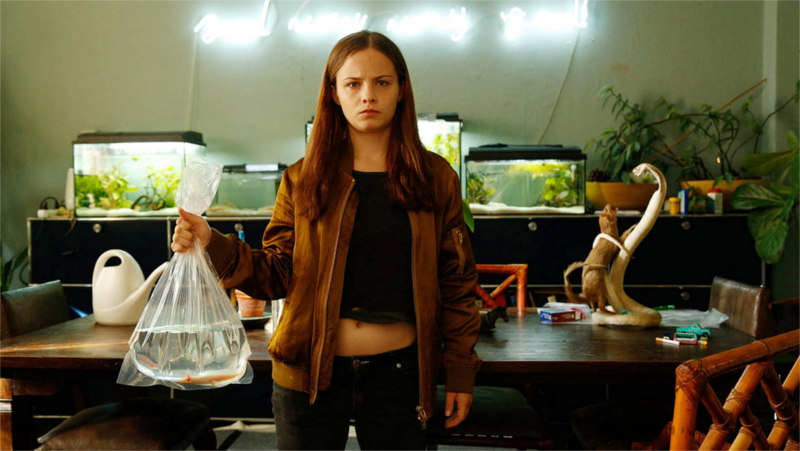German tale of boundless youth doesn’t quite go far enough.
First published as a novel titled Axolotl Roadkill when its author (and now director and screenwriter of the film adaptation) was just 17, Helene Hegemann’s debut film is entrenched in the throes of a very particular kind of youth. It’s one in which tragedy begets drugs, drugs beget sleeping around and sleeping around begets a torrid love affair with an older woman. Axolotl Overkill, both the novel and the film, get their name from the axolotl, a salamander that never fully develops into adulthood. This developmental stagnation is both the film’s most exciting aspect and its most frustrating one. It might force viewers to wonder what the point is, but then, what’s the point of most of the things we do in our youth?
Mifti (Jasna Fritzi Bauer) is somewhere between 16 and 17. Her mother has recently died and she lives with relatives who care for her, but are young enough to want to live their own lives rather than guide her through hers. In one early sequence, Anika (Laura Tonke) drags Mifti from her bed in a valiant attempt to get Mifti to school and it’s played for laughs, until Anika collapses in a heap and sobs. Mifti acts up at school, defying them to expel her, she hooks up with a French actress named Alice (Arly Jover), stays out for days at a time and smokes cigarettes with pretty cringe-y affected coolness.

See ‘Axolotl Overkill’ at MIFF 2017. Image: Supplied
At the core of Mifti’s restless spirit, though, like with all good out-of-control-teen stories, is tragedy. Mifti’s mother died of cancer and it seems to have spun her into this nihilistic approach to self-care and what the future might bring. Her mother is shown once, throwing up in a bag at the end of her bed. This comes wedged in between nights of binge-drinking and railing lines coke, so the sudden jerk towards drama is unexpected. And Hegemann keeps doing this throughout the film, throwing in starkly upsetting shots amid the chaos like deliberately tossing a spanner in the works. The thing is, this erratic tone is the film’s most admirable quality. Held aloft with funny, engaging dialogue (Hegemann has an ear for bullshit – her characters both loathe and indulge in it), Axolotl never reflects the youth-out-of-control cliché, the likes of which we’ve surely seen enough of in American indie dramas (Kids, Thirteen).
The problem is, it doesn’t really go anywhere else. While the novel became a literary sensation and shocked and appalled readers across Europe (before its reputation succumbed to a plagiarism accusation from Nobel Laureate Gunter Grass), the film remains pretty safe to look at. Bauer gives a ready-for-anything performance, bringing vulnerability to the role, but her gameness is partly wasted on the script’s reluctance fully submerge its lead character.

‘Axolotl Overkill’ at MIFF 2017. Image: Supplied
So while the film roils around in a perpetuated youth and does away with any traditional arc for its character – which is admirable, if confusing: I couldn’t quite tell when the affair was taking place or how recently her mother had died – you’ll likely wish it brought its precocious character closer to some point of near-destruction. It’s still a memorable night out, it just won’t cause you to rethink your whole life trajectory (the way a really memorable night out does).
View the full MIFF program here.


